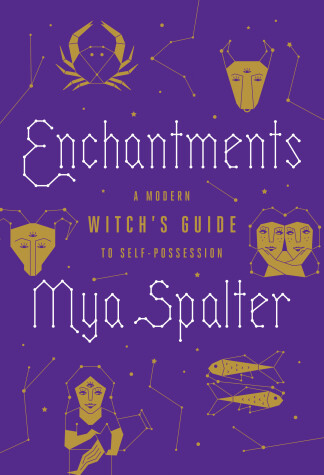While it's another guide to witchcraft, and covers pretty much everything I've read in other books, what makes this book stand out is Spalter herself. Enchantments is written very much like a conversation Spalter is having with you. She's not just telling us about the various elements of witchcraft, but relating it to her own practice, offering examples from her own life to explain certain things further. Enchantments is just such an accessible book because of Spalter's down to earth, friendly, and approachable vibe. She cracks jokes, and is also very encouraging in regards to readers and their own practice. I'd actually say this is a pretty awesome book for those interested in practicing witchcraft to start off with, specifically because of how Spalter has written it.
But Enchantments specifically made a difference for me because of Spalter sharing her own practice. She has quite a versatile approach to witchcraft. She gives an example of a money spell, and how she would do it. One of the herbs required is orris, which is quite difficult to get hold of, but orris is a root of a particular iris, so she cuts an iris from her garden, puts it on her alter, and considers it represented, even if it's not within the money powder she's creating. When she discusses altar set up, and representations of the various elements, she goes through the chalice, the wand, the athame, the pentagram, but then she goes into how she does things.
'I love to discover the purpose and reasoning behind the ritual choices that other people make, but what excites me about magic and witchcraft is figuring out the nature of my own ritual choices. My way represents water with... water. In some kind of vessel, of course, but I don't keep one in particular for the purpose, even thought I just told you that your ritual items should be set aside for spiritual work only. I do what I want! I tend to choose the vessel to suit the day, the mood, the purpose I have in mind at the moment that I'm setting up. I have two of my great-grandmother's champagne glasses, and they can become chalices whenever I desire. If I'm working on some kind of new apartment spell for a friend, I have been known to use a mug that looks like the classic New York "We Are Happy to Serve You" coffee cup because it reminds me of the three of cups in tarot a card that often represents sharing in joyful abundance with friends. But I only mix it up like that because I love hunting around for the perfect little thing. You might not! In which case, it is totally fine to just rock the same altar items no matter what you're doing.' (p8-9)
These are just two example's of the many Spalter gives from her own practice, but these are the two that stick out for me. While all books talk about finding your own path, and how it's your intent that really matters, rather than what you use, and to use your intuition, they all tend to follow a specific way of doing things - which led me to think there is a specific way of doing things. But Spalter's way of practicing magic has opened my eyes to the fact that it really is your intention that matters, and that and your intuition should guide the how and the why. I keep mentioning my fragrance sensitivity, and how I can't use incense, essential oils, or most herbs, but with Enchantments, Spalter pretty much says, "That's ok, use something else." I didn't realise I was feeling a little overwhelmed about the "right" way of doing things until Spalter showed me there is no right way, and I started to breathe a little easier. Enchantments has just made me feel much more confident in adapting and altering as I need, and going with my gut, my intuition, and making my magic work for me.
With this in mind, I really couldn't recommend Enchantments enough - especially if you're really new to witchcraft. It's a fantastic introduction, and, I believe, will make readers feel at ease.
